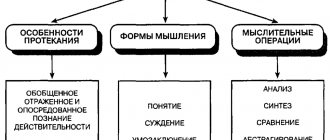Published: October 20, 2021 Category: Skills Author: Lyudmila Redkina
Hello dear readers! Lyudmila is with you.
Every day life presents us with pleasant or unpleasant surprises. And every day we are faced with decisions, analysis of actions, choices. Daily tasks encourage us to use at least some logic when we convince someone, solve work-related issues, and consistently solve everyday tasks. This is where our logical thinking comes into play: if we have it and everything is fine with it, then problems will be solved quickly and efficiently. And if not?
In this article, I have compiled a mini-guide on how to develop logical thinking to become more productive.
- What is logical thinking and what does it consist of?
- Types of logical thinking
- Why you need to develop and use it in life
- Tests
- How to develop logical thinking Advice from a psychologist Remember your childhood
- Train your speech
- Play board games
- Puzzles, crosswords
- Take part in disputes
Forms of abstract thinking
With abstract thinking, a person operates with different knowledge and mental experiences. Over time, all this came to a certain system. Many phenomena of the world are not subject to sight, hearing or touch (and about some we can say that they do not exist at all as such). But such phenomena are part of human life, and therefore must have at least some form.
There are three main forms of abstract thinking: concept, judgment and inference. Let's talk about them briefly.
Concept
A concept is a thought that conveys a common property of various phenomena. Properties may vary, but be homogeneous and similar, which allows them to be combined into one group. Let's take a car for example. It can be an SUV, sedan or hatchback; Different cars have different shapes, colors, characteristics. But their common feature is that they all have wheels, an engine, a gearbox, etc., and that they can be driven. These characteristics (design, purpose) allow properties to be classified into one group.
And we are taught such things from the cradle. Mom talks about “cat”, and we immediately understand that this is a meowing and purring four-legged animal with a tail, etc. Cats come in different breeds and colors, but they all have common characteristics by which they belong to the general concept of “cat” or “cat”.
Judgment
A person uses judgment with the intention of confirming or disproving something. It can be simple or complex. Here is a simple thing - “the cat meows” - it can be expressed specifically and unambiguously. But the complex one - “the cat began to meow because he was hungry” - can be expressed in several declarative sentences.
Also, propositions can be true or false. True ones reflect the actual state of affairs and are based, as a rule, on the absence of an individual assessment of a person, i.e. he judges objectively. A false judgment becomes when a person expresses his interest based on personal reasons, and not on what is actually happening.
Inference
An inference is a thought formed by two or more judgments. This is a new – more complex judgment. Any inference consists of a premise, a conclusion and a conclusion. The premise is an initial judgment, the conclusion is logical thinking leading to a conclusion.
These three forms of abstract thinking form its basis. We operate all abstractions with their help. But what we have said (forms and types of abstract thinking and abstractions, their goals, etc.) may not be entirely sufficient for understanding abstract thinking and its features, since, in essence, all this is theory. Therefore, it makes sense to talk separately about specific examples.
Why you need to develop and use it in life
It is generally difficult for an adult without logic to live in this world. If this structure of thinking sags in a preschooler or schoolchild, everything is clear: “Children...” - you will say and sigh heavily. Whereas the requirements for adults are different. And if to the question “What did you do?”, you answer “On Tuesday,” then there is clearly an inconsistency here.
We have already examined the components of logical thinking, and it is difficult to live without them in life. We will not be able to combine concepts, classify them and draw conclusions from the behavior of people or situations, and we will step on the same rake.
I remember when we took the test in the subject “Logic”, some of my classmates took it 5 times and couldn’t pass. And in their lives they could see this “stepping on the rake” - the guy humiliated him several times, the other would have left the first time, but these are patient, they didn’t prepare for the session in time, others have already passed a long time ago and are resting, and these are puffing. What is the problem? The fact is that no conclusions were drawn or analyzed. So much for problems with logic!
Another example: let's turn to our forefathers. Logic allowed people to avoid not just problems, but even save their lives. Watching how lightning strikes a tree during a thunderstorm and a fire develops, they concluded that danger awaited them. This is where the habit of hiding during a thunderstorm came from. And it’s just inconvenient when drops fall down your collar!
We have come to the conclusion that logical thinking needs to be developed and it is advisable to do this as quickly as possible so as not to screw up your life! And you don’t even have to worry about looking for the best place to do it. I have already prepared for you a unique selection of courses on thinking development, where you will find answers to all your questions.
To master logic, you need to combine theory and practice, using exercises to bring logical components to automaticity, so that you can then easily apply them in real situations.
Is it possible to develop logical thinking in adults?
It is possible and even necessary. The world is changing very quickly, and with the old “baggage” of knowledge it can be difficult to think about something carefully. Many people believe that the basics they receive at school or university will be enough, but this is not entirely true.
The main thing is to overcome your own laziness. Yes, we don’t have enough time, and not everyone will agree to spend free minutes on development. Meanwhile, there is nothing complicated here.
Here you don’t have to sit for hours on books or refuse to communicate with family or friends: many logical exercises can be done in a company.
Did you know? Many people remember the Rubik's Cube, which peaked in popularity in the 1980s. The toy invented by the Hungarian sculptor was so widespread that in the years 80-83 of the twentieth century, even an official newsletter was published entirely dedicated to the cube.
Why do you need to develop logic?
How to develop thinking?
Every person has it to one degree or another. But for a better understanding of reality and the ability to operate with it, logical thinking, developed at a fairly high level, is necessary. This can only be learned through training. Creative thinking can be developed and negative thinking can be eliminated. The brain is trained no less than the muscles, perhaps more. By constantly training thinking and memory, a person can develop throughout his life, methodically improving his performance. The development of intellectual abilities is a guarantee of effective self-improvement.
It is commonly believed that creative thinking is opposed to logic and reason, but this is a false statement. Creative perception of reality is fundamental to creativity. This does not at all mean the need for negative thinking, which is characterized by focusing exclusively on the bad. On the contrary, it allows you to train your brain, clear it of stereotypes and interfering attitudes, and look at everything from the outside. This is how perfect horizons open up. As a result, the ability to solve problems in a non-standard way, to find previously impossible ways.
Books and textbooks on logic
On this page we have selected useful books and textbooks that will help you deepen your knowledge of logic and logical thinking:
- "Applied Logic".
Nikolai Nikolaevich Nepeyvoda; - "Textbook of Logic".
Georgy Ivanovich Chelpanov; - "Logic: lecture notes."
Dmitry Shadrin; - "Logics.
Training course" (educational and methodological complex). Dmitry Alekseevich Gusev; - “Logic for Lawyers” (collection of problems).
HELL. Getmanova; - "Logics.
Textbook for law schools." IN AND. Kirillov, A.A.Starchenko - "Logics.
Textbook for high school." Vinogradov S.N., Kuzmin A.F. - "Logics.
Textbook for humanities faculties." A.A.Ivin - "Logics".
Ivanov E.A. - And others.
Practice SWOT Analysis
SWOT is an assessment of the Strengths and Weaknesses, as well as the Opportunities and Threats of anything: an idea, a proposal, an object.
It’s easier to explain how this is done with an example. Let's say you're thinking about going out to fast food for dinner. Strengths: fast, cheap, tasty. Weak: harmful, high in calories. Opportunities: no need to prepare, free up time to learn programming. Threats: you can get poisoned or simply overeat, and you won’t want to do anything anymore. You can also analyze the option “write code now” or “take on another freelance job.” And make a rational choice.
Exercises to develop logical thinking
There are many ways to develop logical thinking in activities. For example, psychologists advise reading more
And it doesn’t matter whether it’s fiction or scientific literature, the main thing is to comprehend what you read, write down your thoughts and conclusions, argue with the author, catch him in contradictions. Board and computer games based on logic, for example, chess, checkers, sea battle and others, help well in the development of logic.
You can also use specially designed exercises for this purpose.
Exercise "Logical chains"
This is one of the most common training tasks for the development of logic. It has many forms, types, modifications for different ages. His goal is to learn to establish logical connections between things, phenomena, and concepts.
Option 1
Example: two objects are given - a fish and a bottle. Find what can connect them. Possible answers include the following:
- both objects have a similar streamlined shape;
- both the fish and the bottle are associated with water;
- if the bottle is plastic, then it, like a fish, can swim;
- the fish and the bottle may have the same color;
- both objects contain substances useful to humans, etc.
You can continue the list further or choose new objects, making sure that at first glance they are completely different and have nothing in common (a cat and a chair, ice cream and a car, etc.).
Option 2
Two events occur, separated by a relatively short period of time:
- A pencil falls from the desk of the head of the company to the floor.
- A fire breaks out in a room at one of the southern resorts.
Establish a logical connection between the first and second events. See how many intermediate events are in your logical chain. Try to build another one, where there are more or less events.
If the exercise is carried out in a group, then it will be interesting to compare and analyze the logical chains of all participants and choose the most interesting one. You can continue the exercise by coming up with the next event and establishing a connection between the fire and it.
Exercise “Making sentences”
Logical thinking is closely related to speech activity; it generally occurs primarily in conceptual and symbolic form. Therefore, to develop logical thinking, it is useful to write short (and long) stories, essays, notes, and keep a diary.
And for those who are not very good at this or are sorry for the time, you can start with individual proposals. But not simple ones, but ones that unite unrelated concepts and objects. Your task is not just to write a sentence, but so that it looks completely logical.
Let's select three objects that are as unrelated to each other as possible. For example: “squirrel”, “helicopter” and “cup of cappuccino”. Now make up a phrase that logically combines these objects. For example, a sentence like this could be written: “I was relaxing on the veranda when a squirrel fell out of a helicopter flying above me and plopped right into my cup of cappuccino.”
Try to come up with your own sentence or choose the other three objects. For example: scissors, shark, kebab; book, lemon, circus, etc.
Exercise “I’ll say it differently”
This exercise is also for the development of verbal thinking, which is the basis of logical thinking. Come up with some simple, even banal phrase regarding an everyday event. For example: “We love Friday because it is the last day of the work week.”
Now express the same idea, but in different words. The main condition: not a single word from the original phrase should be repeated. How many new sentences with the same meaning can you create?
Logical thinking is undoubtedly important, and it is impossible to do without it in any area of life. But imaginative thinking is no less important.
What is abstract thinking
A strict examiner criticizes a young man who answers too extensively: “Let’s get closer to the subject of the ticket.”
Why does a student throw out clever phrases like that? To hide gaps in knowledge, or even their complete absence. And this is the essence of abstract thinking.
A person's knowledge of the real world is not complete, exhaustive, or specific. But he needs to somehow navigate among unknown phenomena and things, so he thinks abstractly.
If there was no concept of time, how would people arrange meetings? How would scientists describe new galaxies without any idea of shape, distance, speed, or substances? How would science interact without common concepts?
You have witnessed a family quarrel. Your friend’s wife calls him on the phone, crying, screaming, swearing. What conclusions does the brain make?
- Concrete thinking: a friend’s wife is hysterical;
- Abstract thinking: perhaps a friend offended his wife, she endured it for a long time, but now she cannot restrain her emotions.
How to develop thinking in a child General recommendations:
Educational games and tasks contribute to the development of a child’s thinking, and to increase their effectiveness, you can use special recommendations:
1. Encourage even the child’s small success: this will motivate him and bring him closer to new achievements.
2. Don’t rush your child, don’t rush to correct his mistake, give him time to think again and try to find it on his own. All children are different, and what comes easily and quickly to one may be difficult for another. The results may be affected by the child’s temperament, environment, mood, perception, attentiveness, memory, motivation, attitude, etc.
3. Take your time to suggest the correct answer. If the child’s solution is incorrect, praise him for trying to find the right one, encourage him for looking for or finding an original, unusual way to solve it; show that solving such a problem is not easy at first, and that next time he will definitely do better.
4. Try to study at the same time. Let the child look forward to it.
5. Gradually increase the level of difficulty of tasks, but gradually: the load should not be overwhelming, and at the same time it should become a little more complicated, and the tasks should become more varied.
Thinking and memory, perception and attention can be trained on educational brain trainers online in the form of exciting daily games, with rewards, competitions, achievements and their visual graphs. We sincerely wish you success in self-development!
We sincerely wish you success in self-development!
Photo: Lauro Maia
Measure the immeasurable - solve Fermi problems
The great mathematician Enrico Fermi (the same one who is famous for the paradox) believed that in 60 seconds you can evaluate absolutely everything. You only need to know a few facts to roughly calculate how many selfies are taken per day on Earth, how many times on average people use obscene language, or answer another similar question.
I'll explain with an example. Let’s say you were asked: “How many women earn extra money doing manicures in St. Petersburg?” To give an approximate answer, you can use the following logic:
- I remember that Moscow has a population of about 12 million. St. Petersburg is about 2 times smaller - let it be 6 million;
- Half of the girls I know get their nails done by a specialist; about 50% of the population are women. This means that in St. Petersburg there are potentially 1.5 million women “getting their nails done” at a salon;
- People go for a manicure about once every 2 weeks - about 26 times a year. This means that in a year in St. Petersburg it will be 1.5 million * 26 times = 39 million times;
- A manicure takes about an hour, which means one master can serve 8 clients per day;
- Now we need to find out how many masters are required to have time to do manicures 39 million times a year, with a “productivity” of 8 clients per day per specialist. 39 million / 365 days / 8 times a day = 13,356 manicurists in St. Petersburg.
Of course, this is an approximate figure. After all, masters do not work every day, and the calculation does not take into account men who do manicures, children, as well as male masters. Surely something else is missing or mixed up. But in solving such problems, the approach itself is important. By the way, large companies like to ask such questions during interviews in order to see how a person thinks, whether he thinks at all or immediately gives up and says that it is impossible to solve the problem.
Therefore, I suggest you start training. Let's think logically, how many people have given up their dreams in favor of laziness?
Exercises for developing abstract thinking
Think about what figures can be made from these details.
The development of this type of thinking is closely related to speech activity, including the richness of vocabulary, the correct construction of sentences and the ability to analyze information.
Exercise “Prove the opposite”
This exercise is best done in writing.
In addition to convenience, written speech has another important advantage over oral speech - it is more strictly organized, streamlined and linear in nature. Here's the task itself
Choose one of the relatively simple, and most importantly, consistent statements. For example: “Sea holidays are very attractive.”
Now find arguments that prove the opposite - the more refutations, the better. Write them down in a column, admire them, and find a refutation for each of these arguments. That is, again prove the truth of the first proposition.
Exercise "Abbreviations"
This exercise is good to do in company; it is not only useful for thinking, but can also entertain you, for example, during a long journey, or brighten up the wait.
You need to take several random combinations of 3-4 letters. For example: SKP, UOSK, NALI, etc.
Next, imagine that these are not just combinations of letters, but abbreviations, and try to decipher them. Perhaps something humorous will turn out - that’s no worse. Humor promotes the development of thinking. I can suggest the following options: SKP - “Council of Creative Writers” or “Union of Crooked Hands, etc.
If you are completing a task in a team, compete to see who has the most original name and what such an organization can do.
Exercise “Working with Concepts”
Exercises with concepts, or more precisely with abstract categories, which have no analogues in the material world, well develop abstract thinking and establish a connection between thought processes at different levels. As a rule, such categories reflect the qualities, properties of objects, their interdependence or contradictions. There are many such categories, but for the exercise you can take even the simplest ones, such as “beauty”, “glory”, “hate”.
- Having chosen one of the concepts, try to explain as simply as possible (in your own words) what it is. Just avoid explanations through examples (“this, when...), they even scold you for this at school.
- Select synonyms for this concept and try to determine whether there are any differences or nuances between the main word and the synonym.
- Come up with a symbol for this concept; it can be either abstract or concrete, expressed in words or in a graphic image.
After working with simple concepts, you can move on to complex ones. For example, such as: “congruence”, “victimization”, “resistance”, etc. If you do not know what this is, then it is permissible to look at the definitions of these words, but you will still explain them in your own words.
The benefit of developing abstract thinking is not only in learning to solve logical problems. Without it, success in the exact sciences is impossible; it is difficult to understand many economic and social laws
In addition, what is important, this thinking will make speech more correct and clear, will teach you to prove your point of view based on the strict laws of logic, and not because “it seems so to me”
https://youtube.com/watch?v=C3RC5D-pn4c
Argue!
Can you always prove an opinion by choosing the right arguments? Has it ever happened that you couldn’t explain why the movie you suggest watching is better than your friends’ version? The ability to prove your position is not only useful and profitable (if we are talking about bargaining or arguing for a salary increase), but also develops logic. When choosing arguments, you analyze causes and consequences.
There is no need to constantly run into arguments in everyday situations. Go to a lecture, a master class, a lovers-of-anything club and participate in heated discussions. Try to prove random theses mentally or out loud, in a friendly company. For example, argue that Deadpool 2 is an intelligent movie. For training. Participate in rap battles and argue with people on the Internet, after all.
Development methods
The development of abstract thinking is a long and labor-intensive process. But everything is not as scary as it might seem at first glance. In order to develop this type of thinking, a person only needs to devote an hour or an hour and a half two to three times a week to solving logical problems and puzzles. This is a very exciting process, and before you know it, it will become your favorite hobby! In the modern world, there are enough printed publications for the development of logic; exercises and assignments can also be found on the Internet. This means that finding such information will not be difficult. For example, there is a popular website that presents problems of varying complexity.
This type of thinking originates in the East since the times of the ancient world. It arose as a branch of logic. Logic itself is the ability to think and reason, to draw conclusions about things and their essence. Abstract thinking allows you to build theoretical schemes.
With regular exercise, the results will not take long to arrive. Within a few weeks, you will notice that it has become easier to think, make long-term plans, and solve issues that previously caused difficulty.
Children
The little man is an open book in which you can write anything! Children are more receptive to learning and developing any abilities. The baby’s abilities need to be developed through play. The modern toy industry offers a wide selection of games for early development. For example, these could be small puzzles, mosaics, or a banal pyramid. In adulthood, to teach your child to think, invite him to look at pictures in books and explain his understanding of what is happening in them.
Teaching a child to think abstractly is very important. Abstract thinking is not only the key to his creative development, but it is also the ability to question everything and achieve everything through experience.
Developed thinking helps to collect, analyze information and draw independent conclusions, and then support them with proven facts.
How to learn this?
Logical thinking is not given to us from birth, it can only be learned. There are two main aspects of teaching logic: theoretical and practical.
Theoretical logic
, which is taught at universities, introduces students to the basic categories, laws and rules of logic.
Practical training
aimed at applying the acquired knowledge in life. However, in reality, modern teaching of practical logic is usually associated with passing various tests and solving problems to test the level of intelligence development (IQ) and for some reason does not address the application of logic in real life situations.
To truly master logic, you need to combine theoretical and applied aspects. Lessons and exercises should be aimed at developing intuitive, automated logical tools and consolidating the acquired knowledge in order to apply it in real situations.
Based on this principle, the online training that you are reading now was compiled. The purpose of this course is to teach you to think logically and apply logical thinking techniques. Classes are aimed at introducing the basics of logical thinking (thesaurus, theories, methods, models), mental operations and forms of thinking, rules of argumentation and laws of logic. In addition, each lesson contains tasks and exercises to train you to use the acquired knowledge in practice.
Ways to develop logical thinking
If you are determined to take up pumping your brain, then the first thing you need to do is eradicate your laziness and start looking for suitable methods and tasks. There are a huge number of ways to train your thinking. Let's look at some of them in more detail:
Board games. Couples and for a large group of friends, serious and humorous - the choice is huge, you just need to determine which type is more interesting to you. The most popular board games for developing human logical thinking include:
- Chess;
- Checkers;
- Backgammon;
- "Monopoly" ("Big Business");
- “Scrabble” (“Scrabble”, “Bulda”);
- Card games (“Munchkin”, “Uno”).
Logic problems. When searching for and selecting logical problems, use books or the Internet, which is full of various examples and thematic collections. Start with the easiest level, gradually increasing the load, moving towards the highest level of difficulty. If you don’t know the answer, don’t hesitate to peek, because knowing the source data will help you understand the solution and the construction of a logical chain. This type of task includes:
- Puzzles;
- Graphic puzzles;
- Word problems;
- Puzzles;
- Anagrams;
- Puzzles;
- Rubik's Cube;
- Solitaire games (“Mahjong”, types of card layouts).
Example of a logical problem: Seven sisters spend their leisure time together. The first one plays chess. The second one is reading. The third one is cleaning. The fourth one is watering the flowers. The fifth one is playing with the cat. The sixth one is embroidering. What does the seventh sister do? Correct answer: The seventh sister plays chess with the first.
- Test tasks for intelligence. There are many online tests based on the principle of cause and effect. Most often these are games of the “Find the odd one out” type.
- Puzzles, crosswords, scanwords, teawords and more. Particularly difficult are the digital types - Japanese crosswords and Sudoku. Also, an excellent task for developing the ability to think logically would be to independently compose a crossword puzzle.
- Mastering deductive and inductive methods. Deduction is logic in its purest form. In 99.99% of cases, the deductive method gives the correct answer to the problem. In everyday life, induction is more often used - reasoning based on facts that have a certain percentage of falsity. In simpler terms, inductive reasoning begins with particular conclusions and seeks confirmation in general concepts. The deductive method, on the contrary, originates from the external world, and the conclusion is already presented in the form of individual conclusions.
Example of a deductive method: Winter has come and that’s why it’s snowing outside.
An example of the inductive method: It snowed outside, therefore winter has come.
Trainings
Training and development of logical thinking can be supplemented by the following trainings, which you can take for free on our website:
1. Memory and attention are important abilities for logical thinking, which will allow you to concentrate on a large number of mental objects on which logical operations are carried out.
2. Creative thinking together with logic will give you the opportunity not only to draw correct conclusions, but to look for non-standard solutions where logic has reached a dead end.
3. Oratory and writing skills form verbal and logical thinking, and also allow you to apply the acquired knowledge in practice in this course.
4. Mental arithmetic and speed reading are suitable for developing and training intellectual abilities.
5. Human psychology is useful in understanding logical thinking, because it is psychology as a science that studies mental operations, motives, and incentives of a person.
Logic is the science of conceptual thinking.
Logic, as a science of thinking, was born more than 2 thousand years ago in Ancient Greece. At the same time, the main types of logical thinking were described and the laws of logic were formulated, which remain unshakable to this day.
Two types of thinking: deduction and induction
The elementary unit of abstract-logical thinking is the concept. Several concepts combined into a coherent thought is a judgment. They are affirmative and negative. For example:
- “In autumn, the leaves fly off the trees” - affirmative.
- “There are no leaves on the trees in winter” – negative.
Judgments can also be true or false. Thus, the proposition “In winter, young leaves grow on trees” is false.
From two or more judgments one can draw a conclusion or inference, and this whole construction is called a syllogism. For example:
- 1st premise (judgment): “In autumn, leaves fall from the trees.”
- 2nd premise (judgment): “Now the leaves have begun to fly off the trees.”
- Conclusion (syllogism): “Autumn has come.”
Depending on the method on the basis of which the inference is made, there are two types of thinking: deductive and inductive.
Induction method. From several particular judgments a general conclusion is drawn. For example: “schoolboy Vasya doesn’t study in the summer,” “schoolboy Petya doesn’t study in the summer,” “schoolgirls Masha and Olya don’t study in the summer either.” Consequently, “schoolchildren do not study in the summer.” Induction is not a very reliable method, since an absolutely correct conclusion can be drawn only if all particular cases are taken into account, and this is difficult and sometimes impossible.
Method of deduction. In this case, reasoning is built on the basis of general premises and information given in the judgments. That is, the ideal option: one general judgment, one particular one, and the conclusion is also a private judgment. Example:
- “All schoolchildren have summer holidays.”
- “Vasya is a schoolboy.”
- “Vasya has a summer vacation.”
This is what the most basic conclusions in logical thinking look like. True, in order to draw the right conclusions, certain conditions or laws must be observed.
Laws of logic
There are four basic laws, and three of them were formulated by Aristotle:
- Law of identity. According to him, any thought expressed within the framework of logical reasoning must be identical to itself, that is, remain unchanged throughout the entire argument or dispute.
- Law of contradiction. If two statements (judgments) contradict each other, then one of them is necessarily false.
- Law of the excluded middle. Any statement can be either false or true, something third is impossible.
In the 17th century, the philosopher Leibniz supplemented these three with the fourth law of “sufficient reason.” Proof of the truth of any idea or judgment is possible only through the use of reliable arguments.
It is believed that it is enough to follow these laws, be able to correctly formulate judgments and draw conclusions, and you can solve any most complex problem. But it has now been proven that logical thinking is limited and often fails, especially when a serious problem arises that does not have one single correct solution. Abstract logical thinking is too straightforward and inflexible.
The limitations of logic were proven already in the era of Antiquity with the help of so-called paradoxes - logical problems that have no solution. And the simplest of them is the “liar paradox,” which refutes the inviolability of the third law of logic. In the 4th century BC. e. The ancient Greek philosopher Eubulides shocked supporters of logic with one phrase: “I am lying.” Is this a true or false proposition? It cannot be true, since the author himself claims that he is lying. But if the phrase “I am lying” is false, then the proposition becomes true. And logic cannot overcome this vicious circle.
But abstract-logical thinking, despite its limitations and inflexibility, is best manageable and itself “organizes the brain” very well, forcing us to adhere to strict rules in the thought process. In addition, the abstract form of thinking continues to be the highest form of cognitive activity. Therefore, the development of abstract thinking is important not only in childhood, but also in adults.
What is strategic thinking
In psychology, strategic thinking is the cognitive ability that allows you to complete complex tasks. The main aspect of this quality is a step-by-step vision of the path to achieving the goal. An individual needs to be aware of the consequences that arise if certain decisions are made. This type of mind is opposed to straightforward thinking, when a person always chooses the most obvious way to solve a problem.
The development of this personal quality is important in entrepreneurship, creativity, science and other activities
Strategy is a term that comes to us from the ancient Greek language. Initially, this word was associated only with military craft. To win any battle, a general combat strategy was required, combining several tactics. Later the term became more general, so today strategy refers to a way to achieve a goal. The most accessible example is the game of chess. To win, the player must gradually change the position of his pieces. However, a straightforward approach is ineffective, since sometimes it is necessary to make sacrifices and make non-standard decisions.
Strategic thinking is required not only in logic games and military craft. The difficulties of everyday life force people to show analytical skills. This quality is inextricably linked with intelligence, since step-by-step planning of activities is a complex cognitive process. Individuals who constantly develop their minds achieve success in work and other areas of life.










